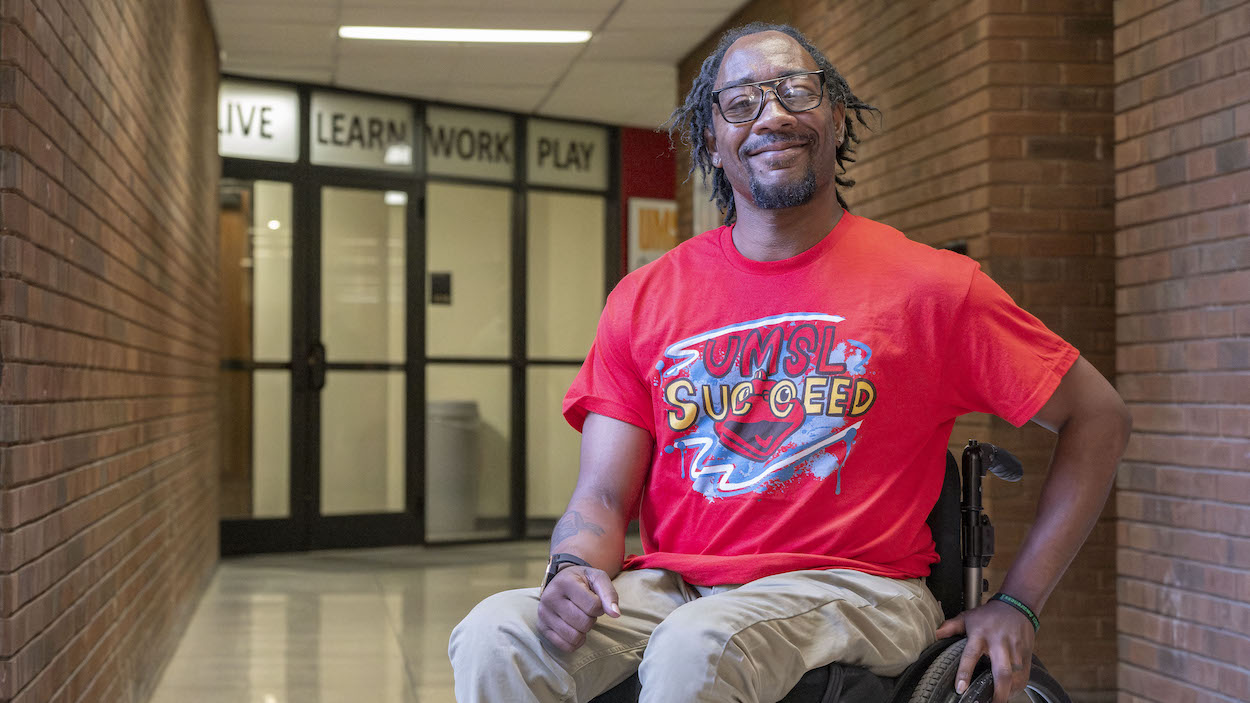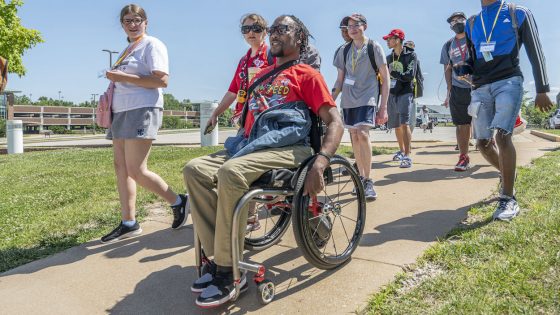Social Work graduate Dondi Baldwin is an advocate for students and community members with disabilities.

Dondi Baldwin, who will graduate in August with a bachelor’s degree in social work, is currently completing her practicum with the Office of Inclusive Higher Education’s Succeed program. (Photo: Derrick Holtmann)
Dondi Baldwin likes to say he was doing social work before he even knew it was a thing, it wasn’t something he necessarily planned, it was something life just thrust upon him.
At age 32, Baldwin suffered a traumatic spinal cord injury when a stray bullet struck him while he was playing on a friend’s porch. The injury left both of his legs paralyzed, and while recovering, he learned he would need to use a wheelchair for the rest of his life.
Baldwin was devastated at first, but continued to persevere and work hard to provide for herself and her children.
“I looked for groups where I could talk to people who were dealing with some of the issues I was having, and I couldn’t find much,” Baldwin said.
Undaunted, he generated the support he needed.
“I built a community with a group of friends I’d met over the years,” Baldwin said. “We started a peer mentorship support group.”
The group, made up of people living with similar traumatic spinal cord injuries, has been meeting twice a month for nearly a decade, first at the Rehabilitation Institute of St. Louis and now at Paraquad. During that time, Baldwin realized he had a talent for helping people and facilitating group meetings, an experience that inspired him to go back to school and pursue a career in social work.
Baldwin will graduate from the University of Missouri-St. Louis this August with a bachelor’s degree in social work. He is currently completing his practicum with the Office of Inclusive Higher Education’s Succeed program. After graduation, he hopes to pursue a full-time position in higher education and plans to earn a master’s degree in social work from UMSL.
Growing up across the river in Cahokia, Illinois, Baldwin had little interest in academics: He dropped out before graduating high school and took a full-time clerical job at a litigation law firm in downtown St. Louis, but deep down he knew he didn’t want to stay in the legal field.
Baldwin’s injury was a tragedy, but it also meant he had to reevaluate his priorities. In 2017, Baldwin earned his GED and enrolled in community college. After three years of juggling activism, school and work, he earned his associate’s degree.
“I enjoyed going back to school,” Baldwin said. “I loved belonging to a school.”
At the time, he was attending Missouri Vocational Rehabilitation, a program that helps people with disabilities access resources and services that help them gain and maintain employment, and his VR counselor encouraged him to continue his education.

Baldwin interacts with future students at a recent summer camp. (Photo by Derrick Holtmann)
At first, Baldwin wasn’t sure which direction to take academically, but he thought about what he was already doing outside of school and work. He grew his peer support group to 30 regular members and became a trusted adviser among family and friends on topics ranging from obtaining medical supplies to social services. He also helped his uncle, who has an intellectual disability, find support and housing through organizations like Places for People.
“I was already going to these places for my uncle, but I also go to advocacy groups,” he said. “I’m already active in the community and advocacy for disability rights. Why not go to school and get a job doing that?”
Baldwin enrolled in her bachelor’s degree program in social work at the beginning of the COVID-19 pandemic, and her academic advisor in the social work department, Tull Moore, helped her create a schedule of online courses that worked with her schedule and continued in-person instruction even after classes returned to campus for the most part.
Faculty at UMSL have been similarly supportive as Baldwin juggles her studies with work, childcare and running a support group.
“All the professors I’ve had on campus have always been flexible,” he says. “College is about being responsible and being an adult. All my professors are willing to help students and I think they genuinely want you to pass and succeed.”
In classes taught by Associate Professor Diane O’Brien and Assistant Professor Anna Bender, Baldwin learned how to speak effectively with clients, actively listen, and facilitate group meetings — then was able to directly apply those lessons to real-life situations.
“As soon as class was over, I would go to a group meeting and practice,” he said with a laugh. “What no one knew was that I was actually using the tools and skills I’d learned that day.”
He also utilizes these skills in his practicum at Succeed, where he works as a coach and tutor.The School of Education program offers UMSL students with intellectual and developmental disabilities the opportunity to develop academic, life and career skills while pursuing a two-year President’s Certificate and admission to a degree program.
When Assistant Director Andrew Johnson Chrithermes and Program Coordinator for Family and Student Support Heather Cowan gave a presentation to Baldwin’s social work class, Baldwin was immediately drawn to Succeed’s mission.
He’s already a familiar face among Succeed students and a popular member of the organization. When he’s meeting with one of them at Nosh, other students will often pull him aside or try to get his attention. To him, these interactions are proof he’s making a difference. And it’s these interactions that make his practicum so rewarding.
“I love building relationships with them and seeing them succeed,” Baldwin said. “I think this organization is great, and I understand why people come to this organization, but I really understand why people stay — they stay because of the people.”
Ideally, Baldwin would like to be one of those people, stay at Succeed full time and continue making a difference at UMSL in the near future.


